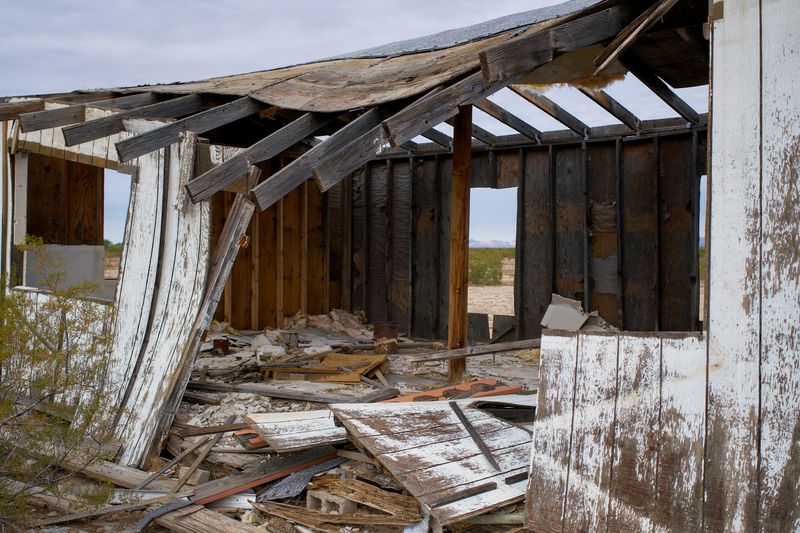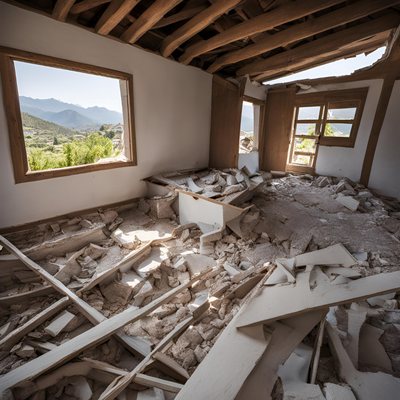Seismic Activity, Earthquakes, and Public Adjusters

While earthquakes and seismic activity might not be the first hazards that come to mind for Florida and Colorado homeowners, they represent a real and growing threat. From the minor tremors caused by nearby construction to larger geological shifts, seismic events can lead to extensive property damage.
However, navigating an insurance claim for seismic damage can be a daunting task. Insurance companies often delay, deny, or misclassify claims, sometimes labeling earthquake-related damage as sinkhole damage to enforce higher deductibles and lower payouts. What are the causes of seismic activity? What are some distinctions between earthquakes and sinkholes? How is this relevant to your insurance claim? What challenges will you face from your insurer, and how can we help you maximize your settlement?
At Florida State Public Adjusters, Inc., we specialize in advocating for homeowners impacted by seismic activity. We fight and strategize so that your claim is accurately assessed and fairly compensated.
What Causes Seismic Activity?
Seismic activity encompasses more than just earthquakes. Any ground movement, whether natural or man-made, can fall under this category and potentially damage your property.
Here are the primary sources of seismic activity in Florida and Colorado:
Earthquakes
Earthquakes are the most recognized form of seismic activity, caused by the sudden release of energy in the Earth’s crust. While Florida experiences fewer earthquakes than Colorado, minor tremors do occur, particularly along fault lines. Colorado, however, is more seismically active, with events ranging from small tremors to moderate quakes that can cause significant structural damage.
Commercial Construction and Blasting
In both Florida and Colorado, construction projects (especially those involving heavy machinery, blasting, drilling, or pile-driving) can trigger ground vibrations strong enough to damage nearby homes. These vibrations may lead to cracks in walls, uneven foundations, and other structural issues.
Mining and Resource Extraction
Colorado, with its extensive history of mining, is particularly susceptible to seismic activity caused by resource extraction. This includes both traditional mining operations and hydraulic fracturing (fracking), which can cause ground shifts that can negatively impact properties within 1,000 feet.
Geological Settling
Florida's unique karst terrain, composed of limestone bedrock, is prone to subtle ground shifts. These shifts, though less dramatic than earthquakes, can still lead to foundation cracks, structural instability, and other forms of property damage. Other sublayers of earth can also result in geologic settling, but this cause of seismic activity is particularly common in southern and central Florida.
How Seismic Activity Damages Homes
Seismic events can lead to various types of damage, often affecting a property’s structural integrity and safety. Here’s what you need to know:

Ground movement can cause cracks in foundations, walls, and ceilings. Severe seismic events may even lead to partial or total collapse.
2. Foundation Instability
Seismic vibrations can shift a home’s foundation, leading to uneven floors, sticking doors, and other issues that compromise the property’s livability.
3. Plumbing and Utility Line Damage
The shaking caused by seismic activity can rupture pipes, disrupt water and gas lines, and damage underground utilities, leading to additional repair costs.
4. Cosmetic Damage
Even minor seismic activity can cause superficial cracks in drywall, tile, or plaster. While these may seem minor, they can signal more serious underlying structural issues.
Proactive Steps to Protect Your Home from Seismic Activity
While seismic events can’t always be predicted or prevented, you can take steps to mitigate their impact:
Install Seismic Reinforcements
Strengthen your foundation and walls to withstand ground movement.
Maintain Your Property
Address cracks or weaknesses in your home’s structure before they become larger issues.
Secure Heavy Items
Prevent injuries and interior damage by anchoring furniture, appliances, and decor to the walls or floor.
Review Your Policy
Ensure you have the appropriate earthquake or sinkhole endorsements to protect your property.
Insurance Challenges with Seismic Damage Claims
Seismic damage claims are complex, and insurance companies often look for ways to minimize their financial exposure. Here are the most common challenges homeowners face:

1. Limited Coverage
Standard homeowners policies in both Florida and Colorado often exclude earthquake damage unless a specific rider or endorsement is added. Without this coverage, your claim may be denied outright.
2. Delayed Investigations
Insurers may delay their investigation into seismic damage, claiming the need for further assessment. These delays can leave homeowners struggling to repair their homes or prevent further deterioration.
3. Misclassification of Damage
As discussed earlier, insurers may mislabel earthquake or seismic damage as sinkhole damage to enforce a higher deductible or exploit policy exclusions.
4. Insufficient Settlement Offers
Even when coverage is confirmed, insurance companies may undervalue the cost of repairs, leaving you to cover the difference out of pocket.
Earthquakes vs. Sinkholes: Why the Distinction Matters
While both earthquakes and sinkholes can cause ground movement, they are fundamentally different phenomena. Unfortunately, insurance companies may blur these lines to reduce their payout obligations.

Earthquakes:
- Cause: Result from tectonic shifts or man-made activities like blasting.
- Damage: Includes foundation cracks, wall separation, and roof collapses due to lateral or vertical ground movement.
- Insurance Treatment: Typically requires a separate earthquake endorsement or rider in most policies.
- Cause: Occur when underground voids form due to the dissolution of limestone, causing the ground above to collapse.
- Damage: Often manifests as localized depressions, cracks in floors and walls, or complete structural failure.
- Insurance Treatment: Covered under specific sinkhole provisions, often with higher deductibles.
Some insurers may misclassify earthquake or seismic damage as sinkhole damage, especially in Florida, where sinkhole deductibles are notoriously high. A sinkhole deductible often amounts to 10% of a home’s insured value. On a $300,000 policy, this translates to a $30,000 deductible — far higher than the standard property damage deductible for earthquakes or other perils.
We have the expertise to challenge these misclassifications. By ensuring your claim is properly categorized, we prevent insurers from unfairly imposing higher deductibles or denying rightful coverage.
How We Can Help
Navigating the insurance claims process after an earthquake can feel overwhelming, especially when you’re dealing with the emotional and financial toll of storm damage. That’s where we come in. We specialize in representing homeowners and businesses with complex seismic damage claims.
Here’s how we advocate for you:
Accurate Damage Assessment
We work with structural engineers, geologists, and other experts to pinpoint the exact cause and extent of your damage. This ensures your claim filing reflects the true scope of your loss.
Policy Analysis
Our team reviews your insurance policy to identify all applicable coverages, exclusions, and deductibles. We fight for your insurer to apply the correct provisions to your claim.
Comprehensive Documentation
We compile a robust claim package, including photos, repair estimates, and expert reports, to support your claim. No detail is too small to include.
Challenging Misclassifications
If your insurer attempts to classify earthquake damage as sinkhole damage (or vice versa) we provide the evidence needed to dispute their findings and secure the appropriate settlement.
Negotiation and Advocacy
We handle all communications with your insurance company, pushing for a fair and timely resolution. If your claim is denied or underpaid, we fight to reverse these decisions and secure the compensation you deserve.
Quicker Resolutions
We work diligently to streamline the claims process, reducing delays and helping you begin repairs as soon as possible. We place stricter deadlines on your insurer while making sure that we meet the insurer's deadlines for your end of the claim.
Peace of Mind
Filing and fighting a hurricane claim is stressful, especially when dealing with insurers’ delays or denials. Balancing work, family, a ravaged home, and an aggressive insurance carrier is often too much. Let us handle the hard part so you can focus on restoring your home and life.
Why Choose Us?

When it comes to claims for earthquakes and seismic activity, you need a team that understands the unique challenges homeowners and businesses face. We bring unmatched expertise, compassion, and commitment to every case.
- Licensed Experts: Our team of experienced public adjusters is licensed and well-versed in Florida’s and Colorado's insurance laws.
- Locally-Based Knowledge: We know the science behind the different causes of seismic activity and their impacts on insurance policies, giving us a strategic edge in advocating for our clients.
- Proven Results: We've helped countless homeowners secure settlements that fully reflect the scope of their losses.
- Client-First Approach: We work exclusively for policyholders like you, never insurance companies. You can trust that we’re always in your corner.
We will always offer the following:
- Free, no-obligation consultations
- Experienced, licensed public adjusters
- Thorough, accurate damage assessments
- Aggressive negotiation with insurers
- Complete claim management, from start to finish
Seismic activity may be unpredictable, but your response doesn’t have to be. With the right expertise and representation, you can navigate the claims process confidently and secure the compensation you need to rebuild and recover.
We’re committed to helping homeowners in Florida and Colorado maximize their insurance settlements for seismic damage. Contact us today for a free consultation.
Call (888) 518-5678 or email admin@floridastatepa.com to get started!